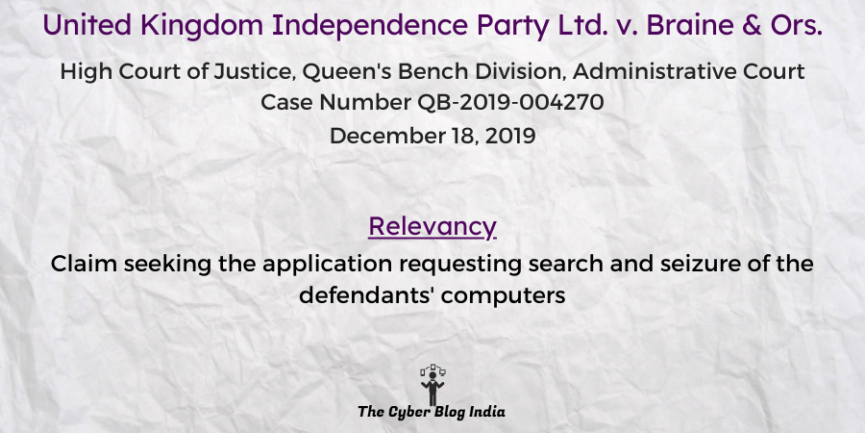United Kingdom Independence Party Ltd. v. Richard Braine & Ors.

United Kingdom Independence Party Ltd. v. Richard Braine & Ors.
[2019] EWHC 3527 (QB)
In the High Court of Justice, Queen’s Bench Division, Media and Communications List
Case Number QB-2019-004270
Before Justice Warby
Decided on December 18, 2019
Relevancy of the Case: Claim seeking the application requesting search and seizure of the defendants’ computers
Statutes and Provisions Involved
- The Human Rights Act 1998 (Section 12)
- The Computer Misuse Act 1990
- The Data Protection Act 2018
Relevant Facts of the Case
- The United Kingdom Independence Party (UKIP) opened applications for election to its National Executive Committee. In this committee, the Leader, Deputy Leader, and General Secretary are the members.
- Armstrong, in his capacity as the Secretary-General and Returning Officer, was also an ex-officio member.
- Disputes arose regarding his conduct as the Returning Officer, particularly in the way he vetted applications from candidates for election.
- There was a heated debate about the correct interpretation of the party’s constitution. On October 15th, ms Herriot moved the NEC that they should vote to remote Armstrong from his position. The NEC members voted in favour of the motion.
- He did not accept the validity of the move. Later, Braine suspended Herrior and purported as Party Leader to suspend other NEC members.
- Dent was given the authority to visit the party headquarters. In the meantime, the NEC members did not know about their suspension.
- Considering it invalid, they passed a resolution to remove the authorisation of Braine and Armstrong. Later, Herrior reported Braine, Sharp, and Armstrong to the police for fraud, computer misuse, and violations under the Data Protection Act 2018.
Prominent Argument by the Counsels
- The claimant’s counsel argued that the case is not within Section 12 of the Human Rights Act. It only needs to satisfy the lower American Cyanamid threshold. The counsel submits that it is a case for the flexible operation of the statutory standard.
- The defendants’ counsel submitted that they did not obtain any information from the UKIP servers. They did not have any knowledge or involvement in the blackmail email. Moreover, the UKIP’s expert report did not provide any support for the claimant’s case and demonstrated otherwise. The claimant’s application does not stand any basis in law or fact to uphold the interim injunction.
Opinion of the Bench
- The court will not grant an interim restraining order unless the court is satisfied that the claimant will most likely succeed at trial.
- The claimant failed to substantiate the sufficiency of evidence for the grant of interim injunction. Moreover, the claimant also failed to represent a credible threat by the defendants, or someone else.
- Also, the claimant’s request for the order is too wide and unspecific.
Final Decision
- The court rejected the claimant’s application.
Khilansha Mukhija, an undergraduate student at the Institute of Law, Nirma University Ahmedabad, and Yagyanseni Acharya, an undergraduate student at VIT School of Law, Chennai, prepared this case summary during their internship with The Cyber Blog India in January/February 2024.
